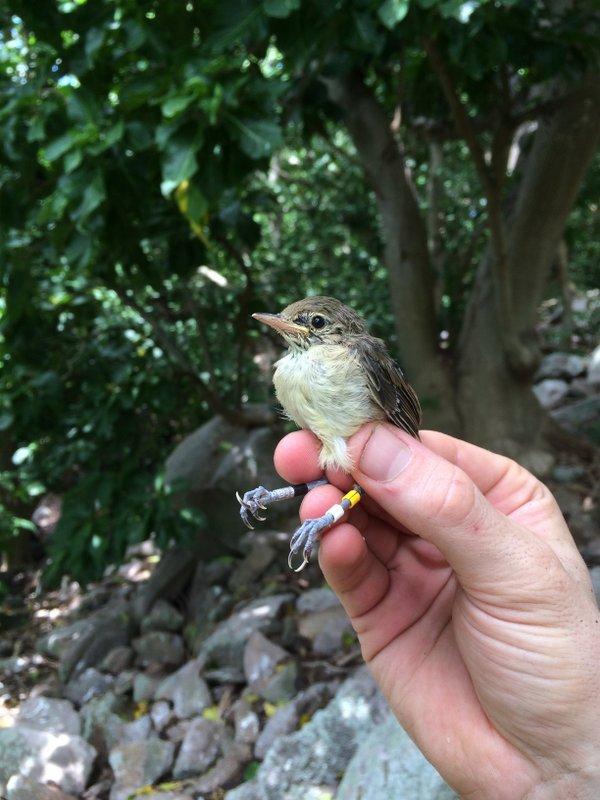
Credit: Martijn Hammers, University of Groningen
The offspring of older animals often have a lower chance of survival because the parents are unable to take care of their young as well as they should. The Seychelles warbler is a cooperatively breeding bird species, meaning that parents often receive help from other birds when raising their offspring. A study led by biologists from the University of Groningen shows that the offspring of older females have better prospects when they are surrounded by helpers. This impact of social behaviour on reproductive success is described in a paper that was published on 19 January in the journal Evolution Letters.
The Seychelles warbler lives on a tiny island called Cousin Island, which is part of the Republic of Seychelles, an island country in the Indian Ocean. On Cousin Island, there are just over 300 birds, nearly all of them ringed with colour rings so that each individual bird can be recognized. The population has been studied for several decades. Martijn Hammers, a biologist at the University of Groningen, has frequently visited the island and is studying the interaction between social behaviour and ageing among these birds.
Natural laboratory
Cousin Island resembles a natural laboratory, Hammers explains. ‘It is isolated, so there is no influx of new birds and birds rarely migrate to other islands. Furthermore, from 1985 onwards, we have ringed almost all warblers on the island, which allows us to observe their behaviour, reproduction and survival.’ The Seychelles warbler is a cooperative breeder: each territory is held by a dominant couple and they sometimes allow helpers to stay there. ‘These helpers are usually their own young from earlier breeding attempts and they can assist in breeding and in feeding the chicks. In return, these helpers can use the resources that are available in the territory and female helpers are occasionally allowed to lay an egg in the dominant birds’ nest.’
As the parent birds age, their ability to feed their young diminishes. In this new study, Hammers and his colleagues from the University of Groningen (The Netherlands) and the University of East Anglia (UK) wanted to find out whether social behaviour, in particular the care for offspring provided by helpers, affects the breeding success of older birds. To this end, Hammers analysed over 20 years of data on these birds. He specifically looked at the frequency of chick feeding and the survival of young birds.
Humans
‘Our prediction was that having helpers would be beneficial for the survival of chicks from older birds. And this turned out to be true, but only for older females,’ says Hammers. The males of this species contribute less to feeding the chicks than females and their behaviour may therefore be less important for offspring survival than the behaviour of the females. ‘That may be because the males are not always sure that they are feeding their own offspring since 40 per cent of the young are not their own,’ explains Hammers.
The data show that while helpers compensate for age-related declines in female reproductive performance, individual helpers do not work harder when the dominant female is older. ‘It appears to be a more passive process, in that older birds recruit more helpers who collectively help more.’ The implications of his findings are that it is beneficial for older female birds to display social behaviour – allowing helpers to live in their territory – since it increases their reproductive success. ‘It would be interesting to see if this is a general principle that also applies to other animal species, or even to humans.’
In a previous study, Hammers showed that getting help with the kids also slows down the ageing of the parents. ‘This effect was also most pronounced in older females. This new study provides additional evidence for an interplay between age and cooperative breeding.’
###
Reference: Martijn Hammers, Sjouke A. Kingma, Lotte A. van Boheemen, Alexandra M. Sparks, Terry Burke, Hannah L. Dugdale, David S. Richardson and Jan Komdeur: Helpers compensate for age-related declines in parental care and offspring survival in a cooperatively breeding bird. Evolution Letters 19 January 2021
Media Contact
Rene Fransen
[email protected]
Original Source
https:/
Related Journal Article
http://dx.




